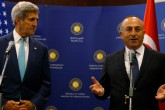As we approach Turkey’s resumption of the rotating presidency of the G-20 in December, a hectic effort is ongoing to finalize the official, corporate and civil programs of action to be implemented through 2015. The presidency of the chief forum of global economic governance will enable Turkey to showcase its ascendancy as a credible actor in global politics with the organization of a plethora of international meetings on economic policy, corporate management (B-20), civil society (C-20) and youth (Y-20).
Though originally formed after the Asian crisis on the sidelines of the International Monetary Fund-World Bank meetings on finance, the G-20 was elevated to the leader’s level after the global financial crisis in 2008. Paradoxically, it was George W. Bush who pushed for the formation of a global “rapid reaction force” against the crisis, but the Barack Obama administration also embraced the smart idea to bring together the world’s 20 “systemically-significant” countries. The forum included major Western countries, Japan and South Korea from East Asia, emerging powers in BRICS countries led by China and MINT countries in which Turkey is a part. Turkey’s inclusion in the G-20 corresponded to a period during which ambitious steps were taken in foreign policy and economic strategy to increase the regional and global clout of the country under successive Justice and Development Party (AK Party) governments. Therefore, Turkey’s inclusion was interpreted as a sign of confirmation by the international community regarding its status as a “systemically important actor” in the global system.
However, the G-20 process itself was wrought with serious problems of legitimacy, representational justice and internal wrangling from the beginning. This became apparent once the urgency of anti-crisis measures became and more general economic reform proposals in trade, development and multinational corporations came to the agenda. The G-20 was seen as a “new forum for old voices” since the policy priorities were largely dictated by the U.S. and U.K. from early on. BRICS countries joined the deliberations but maintained caution against joint actions. G-20 membership included a heterogeneous group with current account surplus countries versus deficit holding countries, currency manipulators versus manipulated markets, fiscal expansionists versus fiscal conservatives and democracies versus autocracies. Meanwhile, the Global Governance Group (3G) emerged as an alternate platform representing small but strategic actors such as Singapore, Switzerland and Chile who were influenced by G-20 decisions.
The G-20’s contested global governance at a time of geopolitical and structural shifts offered middle powers a space in diplomatic opportunity to diffuse conflicts between established and rising powers. Middle powers such as Canada (2010), South Korea (2011), Mexico (2012) and Australia (2014) became effective acting as policy entrepreneurs during their presidencies. South Korea especially exemplified success in advancement of niche issues such as improving the crisis prevention capacities of the IMF and promoting the global development agenda in cooperation with low income countries. This was a result of targeted strategic planning and correctly gauging political opportunity structures in the G-20.
So far, Turkey’s policy entrepreneurship within the G-20 has been comparatively weaker compared to similar middle powers, but holding the rotating presidency presents a golden opportunity to upgrade its activism in economic diplomacy platforms. There are two main axes through which this activism could be expressed. The first axis relates to the monitoring of structural reforms that are ongoing in individual G-20 countries, which are essential for alleviating imbalances and restoring sustainable global growth. The second axis relates to developing innovative policy proposals via coalitions with countries with similar development needs inside and outside the G-20. A successful combination of these two axes would elevate Turkey fr
In this article
- Domestic Policy
- Opinion
- 2008
- 2010
- 2011
- 2012
- 2014
- 2015
- Australia
- BRICS
- Britain
- Canada
- China
- G20
- George W. Bush
- Global Actors | Local Actors
- IMF
- International Monetary Fund (IMF)
- Mexico
- Middle Power
- Republic of Korea
- Türkiye's Justice and Development Party | AK Party (AK Parti)
- UK
- United Kingdom (UK)
- United States (US)
- Western Countries
- Western World

